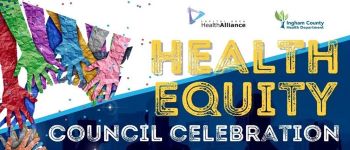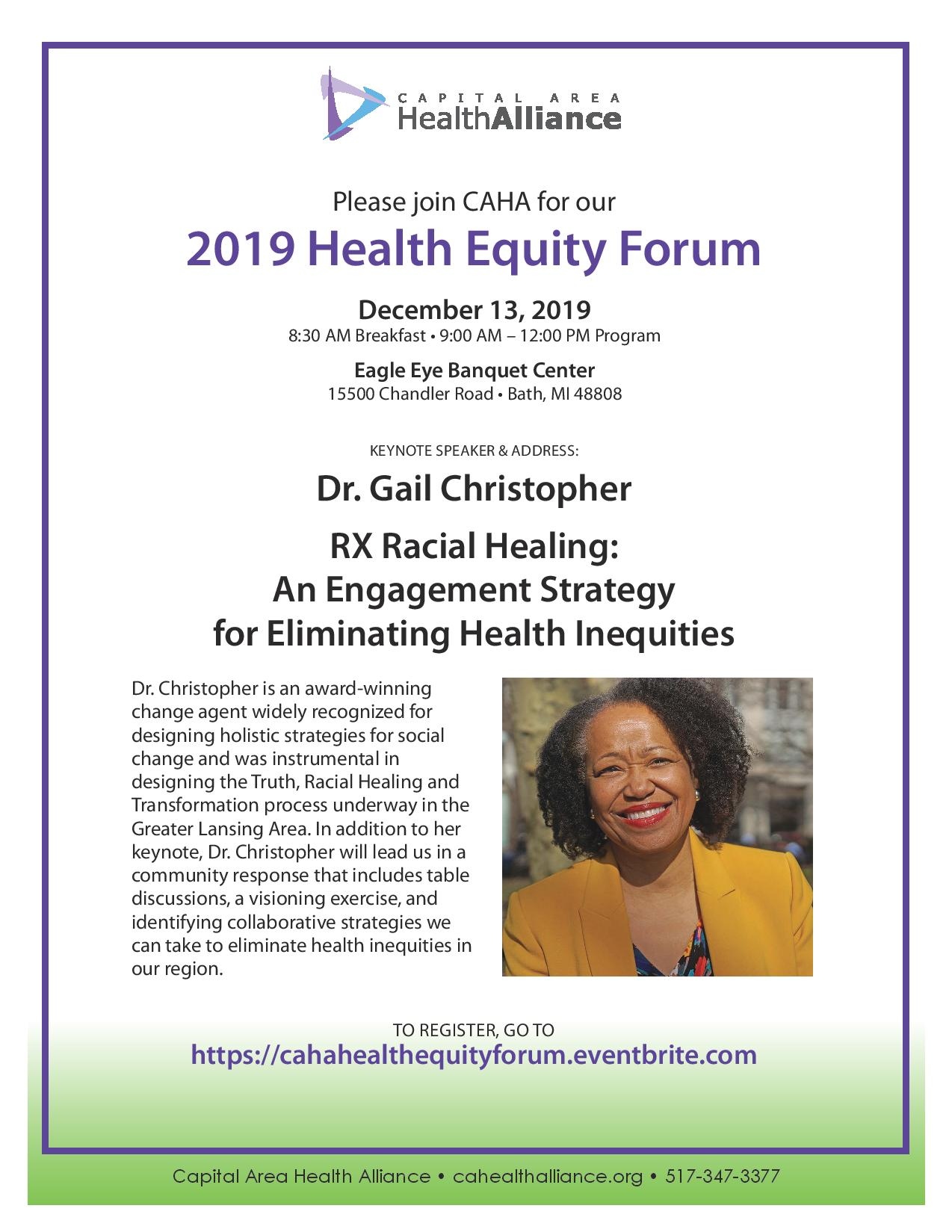Health Equity
Health equity is the fair, just distribution of the resources and opportunities needed for diverse members of a community to achieve well-being. There is considerable need in the Tri-County for our health systems to engage their providers and staff in understanding health inequities and viewing themselves as part of the solution. According to the Institute for Healthcare Improvement, “Health care organizations’ interventions and activities have the capacity to perpetuate, worsen, or ameliorate inequities. Leaders have a responsibility to understand,acknowledge, and openly communicate to their staff the role that the health system has played in perpetuating inequities and the broader historical context of how the inequities came to be. It can be difficult for individuals to admit that their organization has contributed to structural racism through their policies, practices, and norms. However, an understanding of the root causes of racism provides the best opportunity to find solutions that can address the key drivers of inequities.”
http://www.ihi.org/communities/blogs/how-to-build-will-to-improve-health-equity-understand-your-contextIn November of 2018, the CAHA Board of Directors voted to make addressing how racism creates health inequities as a strategic goal. Involved in this goal is explicitly and intentionally talking about the impact that racism has on health, both on an individual and collective level; incorporating a focus on health equity in all CAHA initiatives; and continually building our capacity to address these inequities throughout our work.
Ingham Health Equity Council

In 2022, Ingham County Health Department (ICHD) and Capital Area Health Alliance (CAHA) created a Regional Health Equity Council (HEC) to combat COVID-19-related inequities and risk factors among Black Indigenous, and People of Color (BIPOC) communities within Ingham County. The Council is made up of community members and community organizations experienced in working with minority populations disproportionately impacted by COVID-19. In its first year, the HEC subcontracted $125,000 in grant funds to expand capacity and services to prevent and control COVID-19 among high-risk and underserved populations.
Now in its second year, the HEC is funding 13 mini-grants totaling just over $163,000 to address barriers that put Black and Brown people at a disadvantage when it comes to disease reduction and transmission.
To learn more about the HEC and its projects, visit the
Ingham Health Equity Council page.
Health Equity and Whole Person Care Survey
Linking together our focus of Readiness for Care, Health Equity and Whole Person Care, CAHA developed a
Health Equity and Whole Person Care Survey of Chief Nursing Officers in the region, to learn about their organizations’ work to address health inequities and provide person-centered care. It was sent to Chief Nursing Officers of hospitals and long-term care facilities in the tri-county area in July 2020. Click
here to see survey results.
2019 Health Equity Forum
On December 13, 2019, CAHA hosted a forum to explore the impact of racism on health, what racial healing looks like, and how we achieve both health equity and healing. Over 120 people from area health systems, public health, governmental, community and faith-based organizations were in attendance.
Keynote Remarks Dr. Gail Christopher gave the keynote address, RX Racial Healing: An Engagement Strategy for Eliminating Health Inequities. Dr. Christopher is an award-winning change agent widely recognized for designing holistic strategies for social change and is the Executive Director of National Collaborative for Health Equity. She designed the Truth, Racial Healing and Transformation (TRHT) process which is underway in greater Lansing.
TRHT is a comprehensive, national, and community-based process to bring about transformational and sustainable change, and to address the historic and contemporary effects of racism. In Lansing, TRHT is engaging community members to focus on racial healing through the TRHT framework consisting of five areas: Narrative Change, Racial Healing & Relationship Building, Beyond Separation, Law and Economy. To learn more about greater Lansing’s TRHT process go to
https://www.oneloveglobal.org/trht 
Gold Sponsors
Blue Cross Blue Shield of Michigan
Capital Area United Way
Community Mental Health Authority of Clinton, Eaton, Ingham Counties
Ingham County Health Department
According to Dr. Christopher, the Centers for Disease Control (CDC) has embraced the influence that social determinants (e.g. poverty, education, housing) has on health, but what the CDC has not addressed is what creates these socio-economic factors in the first place. The belief in a hierarchy of human value - racism - is a fundamental driver of the social determinants of health. Christopher went on to say, “Why RX, why a prescription? A prescription is a recommendation that is authoritatively put forth. I am recommending that people in communities and organizations across America become committed to and actively engage in the process of replacing the deeply held, antiquated belief in a false hierarchy of human value with a new understanding of and commitment to honoring the equal and interconnected value of all people.”
Click
here to view the slides from Dr. Christopher’s presentation.
Following the keynote, discussions were held on
Focusing on Our Common Humanity; the
Power of Story; a visioning session on
How Would Health and Healthcare Look Different in the Tri-County If Everyone Were Valued Equally; and
Opportunities to Engage in Local Health/Racial Equity Work.
Here is what the participants envisioned in response to the question “How would health and healthcare look different in the Tri-County if everyone were valued equally?”
Envisioning a connected and caring community:- People would receive the care they need as soon as they need and there would be more available resources for all. The community would be more interwoven and engaged in the medical care and wellbeing of all individuals, and down the line, the overall population would be happier, healthier, more connected, less isolated and productive. Every child would be able to reach his or her potential in such a world.
Envisioning physical health, behavioral health and social services that value every individual, and are accessible to every individual:- All would feel welcomed into health care settings. Practitioners would have time in their schedule to connect and would embrace whole person health and team-based care.
- Providers won’t make assumptions about people’s backgrounds (heath status, lifestyle, etc.) based on race. Society will look at and work to address risk factors and environmental conditions beyond the individual level.
- Preventative healthcare would be promoted and practiced. Preventative diseases would decline, emergency rooms could focus on true emergencies. A shift could occur where mental health would be a high priority resulting in less crime and family dysfunction, while increasing productivity in our workforce.
- Nurses, physicians and administrators would reflect the diverse population that they serve. Caregivers would be respected and appreciated regardless of race or gender.
Envisioning improved outcomes from valuing everyone equally: - No homelessness, people are in healing facilities instead of prisons, and youth are thriving not striving to break free.
- Access to safe and affordable housing, health care, childcare and culturally sensitive health care systems absent of biases.
- Infant mortality and morbidity rates among families of color would be significantly reduced, as would those of low-income families in general.
- Stigmas would go away (behavioral health & substance use disorder) so people would be more open to get help for these conditions. People would not be penalized by the justice system for addiction.
- The racial gaps in health outcomes would narrow and eventually become obsolete. Would start to see less despair; people treating everyone with kindness, understanding and respect.
- Time to access care would be available to individuals & families without repercussions at work.
- No child or person would be hungry. We would all know our neighbors and support them and reach out to others when a need happens.
- People & families won’t have to decide to pay their rent, buy food or go without medication.
- We would see less of one racial group marginalized and represented in homelessness, crime and suffering with mental health.
- Lonely, isolated individuals living alone would learn to improve their mental health by finding motivation and resources to offer resilience factors to children and youth…saving millions of dollars in treatment because an ounce of prevention is worth a ton of cure/treatment. This is freeing!
- Whole person care resources would be easily accessible within and throughout the region in diverse methods, including mobile health vans, family visits, nutrition services, social capacity building networks, mental health advocates eliminating barriers throughout the regions.
Future Health Equity Considerations
Amid COVID-19, the glaring, traumatic, heart-wrenching, and preventable health and racial inequities are being exposed more than ever. On April 9, 2020, Governor Gretchen Whitmer established a statewide Coronavirus Task Force on Racial Disparities. As the Governor noted, “from basic lack of access to health care, transportation, and protections in the workplace, these inequities hit people of color and vulnerable communities the hardest.”
https://www.michigan.gov/whitmer/0,9309,7-387-90499_90640-525224--,00.html. This task force will provide recommendations on how to address these racial disparities and outline steps to address lack of access to care, transportation, and equity in the workplace.
As CAHA moves into the future, we have an opportunity to build on our own health equity work to date and the recommendations that will emerge from this Task Force. In order to move ahead, it is crucial to understand that inequities will not change unless we change. Changing inequity will require looking deep within, wrestling, and reflecting on who and what we value. This is hard work, internal work. Where do we find ourselves on this journey? What role will we play? How will we engage in this work? How each one of us is uniquely situated to help shape change? It is up to all of us.
As we deepen our understanding that racial healing and equity are integral to health equity, the question to be asked is, “How do we foster racial healing?” According to Beverly Tatum, race relations scholar and author of the book
Why are All the Black Kids Sitting Together in the Cafeteria?, the answer is talk to someone different than you. In an interview with a local radio station Dr. Tatum said, "Engagement with that other person, hearing that other person's story, seeing how their humanity is just like yours…those types of conversations lead to relationships. Relationships lead to caring about another person. Caring about another person leads to taking action, and it's the action that ultimately brings about change."
https://www.wmuk.org/post/just-talk-it-shrinks-racial-divide-expert-says
Resources
 In 2022, Ingham County Health Department (ICHD) and Capital Area Health Alliance (CAHA) created a Regional Health Equity Council (HEC) to combat COVID-19-related inequities and risk factors among Black Indigenous, and People of Color (BIPOC) communities within Ingham County. The Council is made up of community members and community organizations experienced in working with minority populations disproportionately impacted by COVID-19. In its first year, the HEC subcontracted $125,000 in grant funds to expand capacity and services to prevent and control COVID-19 among high-risk and underserved populations.
In 2022, Ingham County Health Department (ICHD) and Capital Area Health Alliance (CAHA) created a Regional Health Equity Council (HEC) to combat COVID-19-related inequities and risk factors among Black Indigenous, and People of Color (BIPOC) communities within Ingham County. The Council is made up of community members and community organizations experienced in working with minority populations disproportionately impacted by COVID-19. In its first year, the HEC subcontracted $125,000 in grant funds to expand capacity and services to prevent and control COVID-19 among high-risk and underserved populations.